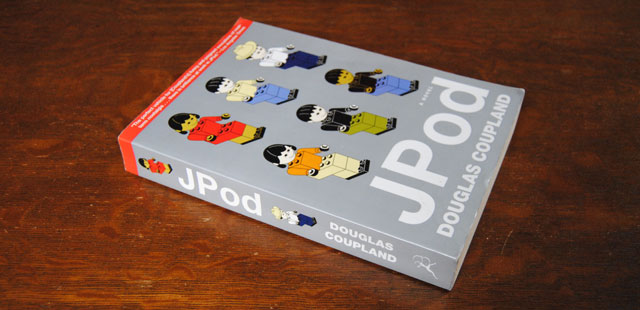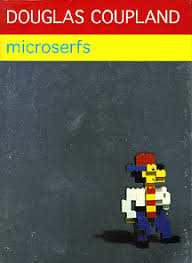
JPod by Douglas Coupland Spoiler Free Book ReviewMaking a video game isn’t easy. If your name is Ethan Jarlewski, your day job coding video games is the last thing you need to be worrying about, especially when your personal life is complicated by “Hollywood, marijuana grow-ops, people-smuggling, ballroom dancing, and the rise of China.”
That’s a lot to take in, but this is a Douglas Coupland novel so it’s not just a straight forward read on Ethan and his life. There are also asides of full-page single-spaced stream-of-consciousness observations and thought provoking quips. There are pages that work within the context of the novel as the characters shirk their duties to test each other by printing out, for example, a large amount of prime numbers or the first thousands of digits of pi with one misplaced digit added in for them to find. These are also included in the book, along with a few others.

That, along with the aforementioned single-spaced pages of quips, completely empty pages, or those devoted to pop culture or labels or other such touchstones make this similar to Coupland’s first novel Generation X. That comparison is more than applicable – I would even argue that this is Generation X meets Microserfs for the new millennium. However, that only works if you’ve read both of those Coupland works. If you have, you probably already read or plan to read JPod.
For those who haven’t, this is about growing up. This is about technological intelligence, more in how you do or do not use it. This is about finding your place in the world and finding yourself. If none of that appeals to you, perhaps the knowledge that JPod solidifies Coupland’s fictional insight into the technological zeitgeist could peak your interest.
The book is slightly dated as it was released in 2006 and set in 2005, but the references are still poignant and almost universally applicable. I do want to warn readers that there exists a self-referential nature to this book; Coupland references Coupland which makes this book feel like the literary equivalent of the View Askew universe (the Kevin Smith universe), and I’m here for it. But this isn’t full of inside jokes and references that will make you lost if this is your first instance of Coupland’s fiction.

Author Douglas Coupland
He actually references his own work in a similar way to how other books might reference a movie or something that maybe someone in the group doesn’t know. As it is explained, you get the understanding as well. Of course, you get more out of it if you do know the source material.
This is a book that speaks to anyone under 40. Those over 40 could gain a little insight into those “youths” of today. Besides, he’s pretty on the nose for some of his early aught’s observations, such as this gem: “I think people in the year 2020 are going to be nostalgic for the sensation of feeling clueless.”
There’s a lot to unpack in this novel, and it’s not just your standard read from one page to the next with the same formatting moving the plot, but that unique design and the concepts therein make it more enjoyable for those who do venture into this novel.
Read the Secret File of technical information and quotes from jPod.